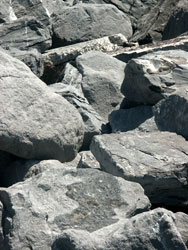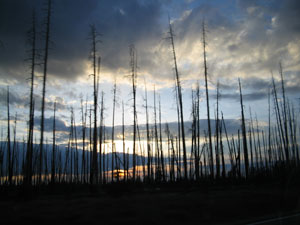| |
Then a great
and powerful wind tore the mountains apart and
shattered the rocks before the Lord, but the
Lord was not in the wind. After the wind there
was an earthquake, but the Lord was not in the
earthquake. After the earthquake came a fire,
but the Lord was not in the fire. And after the
fire came a gentle whisper. When Elijah heard
it, he pulled his cloak over his face and went
out and stood at the mouth of the cave.
Then a voice said to him, ‘What are you doing
here, Elijah?’ He replied, ‘I have been very
zealous for the Lord God Almighty. The
Israelites have rejected Your covenant, broken
down Your altars, and put Your prophets to death
with the sword. I am the only one left, and now
they are trying to kill me too.
(1 Kings 19:11b-14) |
|
I love the way God
handles His servant. Elijah pours out his anger and his
frustration, and God goes out of His way to reassure him
that He is still with him.
| |
|
There is no hint
of reproach, just a necessary reminder that His
ways are higher than ours. As He dealt with
Jacob, David and Jeremiah at times when their
faith faltered, so He gently set Elijah free
from the delusion that everything depended on
him. What a God!
The Lord had promised to pass close by, and
Elijah prepared himself for the wonderful moment
when he would again feel God’s familiar presence
with him. First, however, he would be treated to
an impressive display of the power of God. From
the entrance of his cave, Elijah watched the
awesome violence of a storm rushing through the
deep granite gorges.
What could be a more fitting way for God to
reveal Himself? Had He not spoken to Job out of
a whirlwind, and would He not appear to Ezekiel
in a great windstorm?(1) Jeremiah compared God’s
judgement to a whirling storm that sweeps
everything before it, while Nahum proclaimed
that His way is in the whirlwind and storm.(2)
|
 |
 |
It must have been a terrifying spectacle. Huge chunks of
granite were tossed into the air as they crashed down
the mountainside. There is an irresistible strength in
the wind of God, which neither the work of men nor
creation itself can withstand. We can imagine Elijah in
those days before storm-proof anoraks, huddled in his
cave, wishing he had a fire to shelter by.
It is no coincidence that the work of the Spirit is
likened to a wind.(3) What is the move of the Spirit
that is blowing through so many parts of the Church
except the breath of God? In our own day we have
witnessed an awesome wind of holiness sweeping through
both Church and nation, exposing sin and shaking
complacency. The hurricane that swept through the south
of England in 1987, and the shaking that occurred on the
Stock Exchange at the same time, were crucial reminders
of heaven’s right, and power, to overthrow all the pride
of man’s hopes and achievements. |
Unlike most of us, however, Elijah was already familiar
with the God of the whirlwind. Powerful though this wind
was, the Lord had nothing new to teach his storm-tossed
warrior through it. Suddenly, there came something still
more frightening: an earthquake. It is a terrifying
sensation when the earth, the symbol of our stability,
ceases to support us. Whole cities can be laid waste
within minutes of such shaking.
An earthquake is caused by huge tectonic plates grinding
against each other. The Bible adds to this natural
understanding the supernatural interpretation that it
may also be a sign of the heavenly powers impacting the
Earth.
 |
Consider, for example, the earthquakes that accompanied
the giving of the Law at Mount Sinai, or the tremor that
marked the Israelites defeat of the Philistines.
The
earthquake which swallowed Korah and his friends when
they rebelled against Moses, and the still larger one in
Amos’s day are other prime examples of God’s judgement
on a rebellious people.(4)
|
With such powerful precedents, we are hardly surprised
to read that a mighty earthquake accompanied the death
of the Lord Jesus on the Cross. Later, the building the
disciples were meeting in would be shaken in answer to
their intense prayers. Yet another earthquake set Paul
and Silas free from their unjust imprisonment, and led
to the conversion of their jailer.(5) More recent quakes
in Romania and Armenia have likewise paved the way for
great spiritual harvests in their aftermath.
When London was struck by two such quakes in the late
eighteenth century, they were taken by the Church as a
serious warning and as a call to repentance. It is a sad
reflection that we in the West no longer heed the Power
behind earthquakes. But Scripture predicts that there
are still many mighty earthquakes ahead.(6)
Considering all the upheavals he had already been
through, however, Elijah felt as though God was saying
nothing new to him through the earthquake. Then came a
terrible fire. Again, we need to remember the setting:
sun-scorched scrubland, where huge fires can be started
by a single flash of lightening.
God is revealed throughout Scripture as the One who
answers out of fire. Since fire is also considered the
sign that a sacrifice has been accepted, Elijah must
have expected to see God revealed in it. The crash of
the thunder overhead, the howling of the wind, the
quaking of the earth and the crackling of the flames
must have overwhelmed the prophet’s senses, even as they
sharpened his anticipation.
|
With each fresh manifestation of Nature’s might, Elijah
must have looked to see the power and vengeance of God
unleashed against the apostate nation.
Hurricanes,
earthquakes and firestorms seemed entirely appropriate
symbols to indicate the judgement of God.(7)
Much though
the flames may have reminded him of the great triumph on
Mount Carmel, however, God had nothing fresh to show him
through them.
Elijah had already endured more than one
baptism of fire, as the Lord burnt up the dross in his
life. |

|
The Still Small Voice
| The Lord came to Elijah, not by works of violence,
but in a new and deeper way. One translator renders this
delightfully as being ‘with the sound of silence’.
It is a phrase pregnant with awe and mystery. After all
the elemental cacophony, stillness reigned again at
last. Elijah pulled his cloak over his face and rushed to the
edge of the cave to meet with his God. Here at last was
the presence he had grown to know and love so well
during those prolonged days by the brook Cherith, before
the mighty winds and storms had swept through his life.
Perhaps his joy was mixed with awe and self-abasement,
for there is nothing that makes us so aware of the
holiness of God as when His presence draws near to us.
We are humbled when He speaks, and chastened by the
memory of our own unfaithfulness. |

|
It was as though God were saying, ‘You thought that
because things did not turn out the way you expected, I
had not been working. You are completely mistaken. I am
simply working in a different way. I know the things
that Jezebel has done, but I want you to know that I am
still in control.’
Elijah was amazed and overwhelmed, but he was still
unable to grasp the meaning of all that he had seen and
heard. In a retort of self-justification, he could only
repeat the refrain he had programmed himself to
believe.(8)
Slowly the still small voice breathed peace into the
tumult of his soul. The German word for breast feeding (stillen)
beautifully evokes the mother quieting the child by her
presence and her breast milk. It is a picture of how the
Lord meets our deepest needs.
Love is Stronger than Force
The work God had begun in Elijah so many years ago
was now complete. God was restoring him to a calling he
had at times wanted to run away from – and what prophet
or pastor has not felt tempted to do the same at one
time or another?
God was about to re-commission Elijah for active
service, and to entrust him with some of the most
important undertakings of his life. Now he would
have to retrace his steps, resume his work and
embrace new challenges.
These, in
turn, would prepare the way for a major
dynastic change in the Middle East, and for
a yet greater work of the Spirit in Israel.
What had Elijah learnt by fleeing to the desert? That it
was not for him to remove himself from the ministry to
which God had entrusted him! Perhaps, too, that God’s
gentler ways are often His best. Love is stronger than
force, and the gentleness of God’s mercy can accomplish
more than the wind of His power.
So often, His coming is
not dramatic at all, but so gentle that it is easily
missed. He comes like the dew to refresh us, and His
Spirit as a dove.
|
 |
To live for God’s glory does not mean that we have to
scale the heights of spectacular contests on Mount
Carmel, or do extraordinary things, before we become
acceptable to Him. As someone put it, ‘He has not saved
us to be a sensation, but to be a servant.’ God esteems
faithfulness and devotion. The steady influence of a
quiet consistent life bears far more fruit than we
generally realize.
Reflections
| |
In what ways
can you trace the work of the wind of
holiness in our Church and society?
Ponder the ‘earthquakes’ that have shaken your own
life and disturbed your complacency.
What has been their
outcome?
Consider the baptism of fire that John promised the
Lord Jesus would send.
How has this affected your life?
In what ways have you experienced the Still Small
Voice? |
Selah
| |
Thank You Lord that You are in the winds that blow,
the fires that burn up the dross,
and even in the
earthquakes that so unsettle us.
Most of all we thank
You that You want us to abide in You,
and to discern the
quieter accents of Your love.
Continue to develop this
ability in each one of us,
that we may be both intimate
with You,
and effective for You.
In Jesus’ name, Amen.
|
|
|
|

